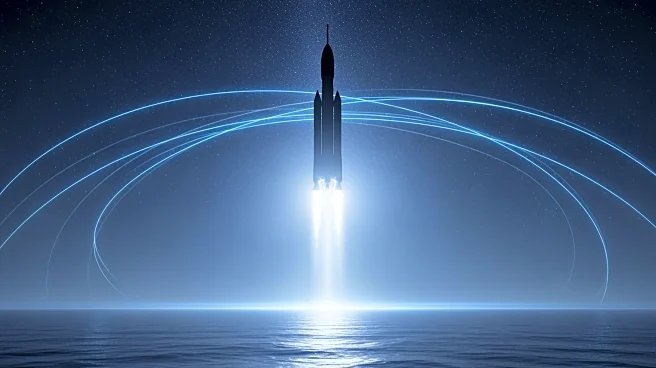What's Happening?
SpaceX is set to launch NASA's Sentinel-6B satellite aboard a Falcon 9 rocket from Vandenberg Space Force Base on November 16, 2025. The launch is scheduled for 9:21 p.m. PT from Space Launch Complex 4 East. The Falcon 9's first stage will land at Landing
Zone 4, potentially creating a sonic boom audible around the base. The Sentinel-6B satellite is designed to measure ocean topography using radar, providing continuous data on sea level trends and atmospheric temperature profiles. This satellite will succeed its twin, Sentinel-6 Michael Freilich, launched in November 2020.
Why It's Important?
The launch of Sentinel-6B is crucial for ongoing climate research and weather forecasting. By providing high-resolution data on sea level trends and atmospheric conditions, the satellite will enhance scientists' ability to track climate changes and predict weather patterns. This data is vital for understanding the impacts of climate change on global ecosystems and human societies. The successful deployment of Sentinel-6B will ensure continuity in oceanographic data collection, supporting both scientific research and policy-making related to climate adaptation and mitigation strategies.
What's Next?
Following the launch, Sentinel-6B will begin its mission to collect oceanographic and atmospheric data. Scientists and researchers will analyze this data to improve climate models and weather forecasts. The information gathered will be shared with international agencies and governments to aid in climate policy development. Additionally, the successful landing of the Falcon 9's first stage will contribute to SpaceX's efforts in reusability and cost-effective space missions.
Beyond the Headlines
The Sentinel-6B mission highlights the collaboration between NASA and the European Space Agency in addressing global climate challenges. This partnership underscores the importance of international cooperation in scientific endeavors, particularly in areas like climate change that transcend national borders. The data collected by Sentinel-6B will not only benefit the U.S. but also contribute to global efforts in understanding and combating climate change.















